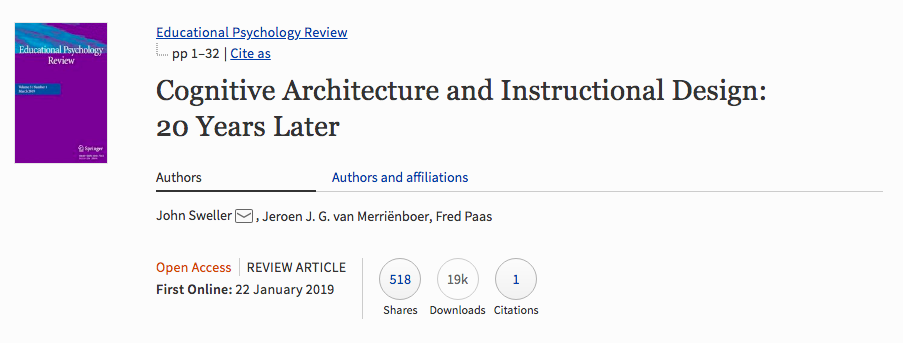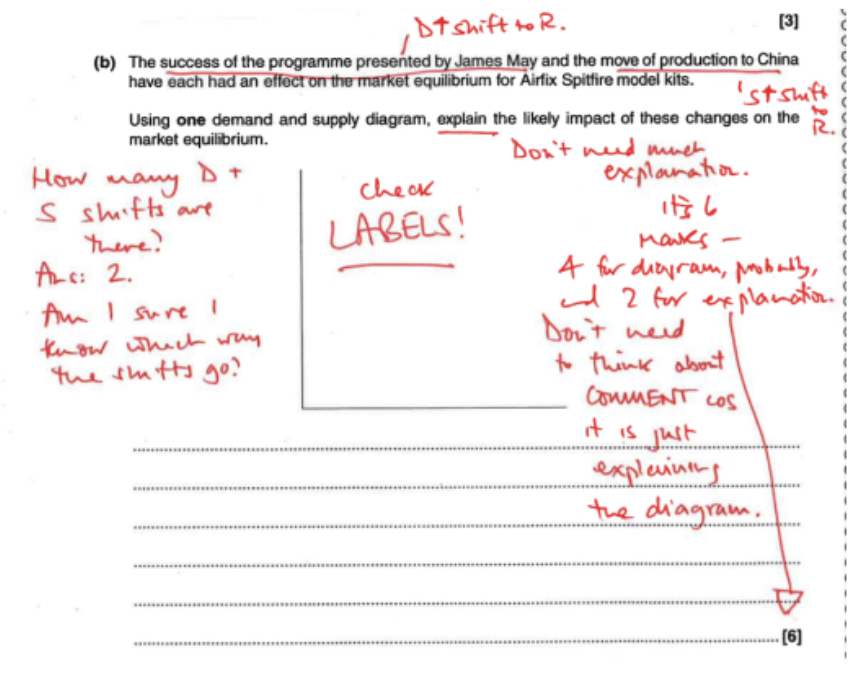We’re back! After a long Australian summer break for Teacher Ollie’s Takeaways, it’s time to launch back into the weekly takeaways!
T1: A perfect way to start the year, this podcast from Craig Barton brings together the voices of over 30 teachers, each speaking about how they run a first lesson with a new class.
T2: With new years come new year’s resolutions. I’m sure that each of us has thought of one, two, or more things we’d like to do better this year. This excellent post reminds us that lasting change comes through habit formation, and gives advice as to how to do just that!
T3: CLT is a research base I’ve been heavily influenced by over the past few years. If you’ve already read and enjoyed my interview with John Sweller, the father of Cognitive Load Theory, I’m sure you’ll enjoy reading this up to date summary of the current state of the research base.
T4, 5, and 6 are all practical, classroom based advice for teaching metacognition, negative numbers, and vocabulary respectively.
T7 and 8 are some references you might like to keep an eye on, the former being a maths program showing promise, and the latter a repository of edu-research.
T9 to 11 are three interesting articles on the topics of desirable difficulties, high expectations, and more about habits (this third one is really just a quick ref)
T12 speaks for itself, and T13 is an excuse ‘But it was altruistic indulgence!’ I’m sure you’re keen to file away for future use!
Did you enjoy Teacher Ollie’s Takeaways throughout 2018? If the answer to this question is ‘Yes’, you may like to consider contributing as little as the cost of a cup of coffee each month to support the sustainable continuation of this weekly twitter/blog roundup. I’d appreciate you taking a look at my Patreon page to explore this option : )
Enjoy : )
(all past TOTs here), sign up to get these articles emailed to you each week here.
What does your first lesson with a new class look like
Aussie teachers! I know that many of us are currently preparing for a new school year with new classes. Here’s a fantastic @mrbartonmaths
Podcast where you can hear from over 30 teachers on how they run a first class. Check it! https://t.co/fDgfiODtTa pic.twitter.com/N3PsjMnB3a— Oliver Lovell (@ollie_lovell) January 28, 2019
How to form new habits, via @hfletcherwood, via @mrbartonmaths
On forming good habits, and breaking bad ones. More good stuff from @HFletcherWood. I particularly like the terminology of increasing or decreasing friction. https://t.co/yjb5Bbpt34 os: A q I’d like to answer is ‘What percentage of my thoughts/actions are conducted via habit?’ pic.twitter.com/4xmndA9edb
— Oliver Lovell (@ollie_lovell) January 29, 2019
Cognitive Load Theory, where are we at? Ht @dylanwiliam, @greg_ashman
Modelling metacognition: One teachers approach, via @johntomsett
How do they teach addition and subtraction of negative numbers in Shanghai? via @Mr_Rowlandson
‘A Shanghai Lesson on Adding Negative Numbers’ . A great exploration of a neat way to approach negative numbers, as well as thoughtful reflections on the process, and value of, generalising. https://t.co/ye7SK2xg6L via @Mr_Rowlandson
— Oliver Lovell (@ollie_lovell) January 31, 2019
A master plan for teaching vocabulary in English, via @tharby
‘A master plan for vocabulary teaching in the English curriculum’. Some great ideas in here, and a great list of handy words for English lit. Via @atharbyhttps://t.co/5DrcXCaP7v
— Oliver Lovell (@ollie_lovell) January 30, 2019
‘Thinking Maths’, a PD program to watch, via @teacherACER
Through a large scale (7000 students) RCT the ‘thinking maths’ program demonstrates significant gains in student achievement. @teacherACER is now extending the program to a teach the teacher model, plus a senior maths component. Results out this year. https://t.co/I7zLFL5zG2
— Oliver Lovell (@ollie_lovell) January 31, 2019
These orgs provide summaries of education research, via @CharteredColl
Wohow! Just found a list of orgs that provide summaries/resources relating to education evidence. Thanks for this list @CharteredColl. Found at the back of these ‘Teacher and school evidence-engagement: self-assessment toolkits’ https://t.co/nKR7X4Gumk pic.twitter.com/XlpsnCyVYu
— Oliver Lovell (@ollie_lovell) January 30, 2019
Retrieval practice and varying the context of learning, via @NickSoderstrom
1) Here’s a very interesting paper via @NickSoderstrom on the power of retrieval practice and varying the context of learning https://t.co/bSQST5GnxD https://t.co/PEGH5q9ehV
— Harry Fletcher-Wood (@HFletcherWood) January 21, 2019
On high expectiations, via @mathsjem and @HuntingEnglish
Two good posts on high expectations. https://t.co/kQjqUOoUpt by@mathsjem and https://t.co/1iRK09OJXw by @HuntingEnglish pic.twitter.com/mqhFWTfNLp
— Oliver Lovell (@ollie_lovell) January 6, 2019
One third of our behaviour is habitual. HT @hfletcherwood
Seminal paper on habitual behaviour, which found over 1/3 of behaviour is habitual, and when we’re behaving habitually we’re less stressed, less emotional, have more spare thinking capacity – but also less proud of what we’re doing. https://t.co/a3gWC50DkU
— Harry Fletcher-Wood (@HFletcherWood) January 29, 2019
Teenagers’ lack of insight into some of their abilities has implications for career counselling, via @ResearchDigest
Teenagers’ Lack Of Insight Into Some Of Their Abilities Has Implications For Career Counselling. I found this snippet interesting. https://t.co/vc8hQmJSYj pic.twitter.com/MdfliwvJzI
— Oliver Lovell (@ollie_lovell) January 22, 2019
The perfect excuse for eating unhealthily, ‘Altruistic Indulgence’, via @ResearchDigest
Your Perfect New Excuse For Ordering Unhealthy Food And Drink: “Altruistic Indulgence” https://t.co/DX5k2xWxr0
— Oliver Lovell (@ollie_lovell) January 22, 2019

